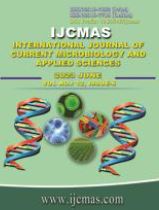


 National Academy of Agricultural Sciences (NAAS)
National Academy of Agricultural Sciences (NAAS)

|
PRINT ISSN : 2319-7692
Online ISSN : 2319-7706 Issues : 12 per year Publisher : Excellent Publishers Email : editorijcmas@gmail.com / submit@ijcmas.com Editor-in-chief: Dr.M.Prakash Index Copernicus ICV 2018: 95.39 NAAS RATING 2020: 5.38 |
Crop growth and productivity has for the most part been at risk of varied a-biotic and organic phenomenon stresses that are solely set to be combined thanks to world climate change. So developing improved varieties and planning newer approaches for crop improvement against stress tolerance became a priority now-a-days. Millets have varied nutrition qualities, and have justifiably been known as “nutri-cereals”. The bulk of the world’s millet crop is created by India, Nigeria, Niger, Mali, Burkina Faso, Chad, and China. millet (Eleusine coracana (L.) Gaertn), very little millet (Panicum sumatrense Philip Roth ex Roem. & Schult.), foxtail (Setaria italica (L.) P. Beauvois) and proso millet (Panicum miliaceum L.) are most ordinarily found species among varied millet varieties. In India, finger millet occupy the biggest space below cultivation among the tiny millets. This minor millet includes crucial amino acids viz isoleucine, leucine, methionine and phenyl alanine which can be poor in other starchy meals. It is likewise recognized for numerous fitness advantages inclusive of anti-diabetic, anti-tumerogenic, atherosclerogenic effects, antioxidant, which can be specially attributed due to its polyphenol and nutritional fiber contents. Being indigenous minor millet it's far used within side the instruction of diverse ingredients each in herbal and malted forms. Single colonies have been isolated through enriching in MRS broth and subsequent streaking on MRS agar plate. Total ten isolated micro organism have been diagnosed. All isolated strains have been characterised for probiotic houses consisting of acid and salt tolerance, phenol tolerance, sugar fermentation, lactose fermentation. Acid tolerance check changed into achieved at pH 2, 4, 6, 8 in MRS broth. Salt tolerance check changed into achieved at 2%, 4% 6% and 8% NaCl in MRS broth. Phenol tolerance check changed into achieved in MRS broth with 0.1%, 0.2%, 0.3% and 0.4% phenol concentration. Sugars consisting of glucose, fructose, sucrose, xylose and lactose have been used for fermentation tests. Results of fermentation check confirmed that maximum isolates fermented all sugars. This observe indicated that isolated species from finger millet batter have capability probiotic houses. All the isolates fermented glucose and lactose with evolution of gas. 90%, 80% and 70% of isolates fermented xylose, fructose and sucrose respectively. The probiotic bacteria were capable of fermenting different sugars and end product is lactic acid. Selected isolates can survive at low pH as well as in high salt concentrations and low concentrations of phenol. Further study is needed to find specific probiotics with specific benefit from finger millet based fermented batter.
 |
 |
 |
 |
 |